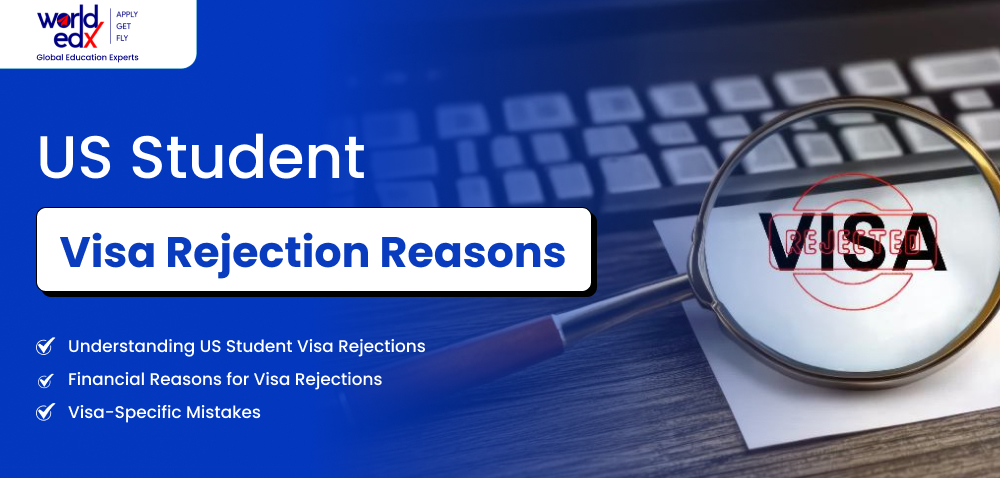Securing a US student visa is an exciting yet challenging part of pursuing higher education in the United States. Unfortunately, not every applicant is approved. Let’s dive into why US student visa applications are sometimes rejected and how to avoid them.
Understanding US Student Visa Rejections
Introduction to US Student Visas
A US student visa is your ticket to study at one of the world’s most prestigious academic destinations. Whether it’s an F-1 visa for full-time students or an M-1 visa for vocational studies, securing this approval is crucial.
Importance of Securing a Student Visa
Your dream of studying in the US can be ruined without a visa. Understanding the process and anticipating potential challenges is essential.
Common Reasons for US Student Visa Rejections
Visa rejections can be disheartening. They often stem from financial, academic, or procedural issues, which can be addressed properly.
Financial Reasons for Visa Rejections
Insufficient Proof of Funds
Applicants must demonstrate that they can afford tuition and living expenses for their studies. A lack of verifiable financial documents often leads to rejection.
Misrepresentation of Financial Details
Providing incorrect or inflated financial information is a red flag for visa officers, leading to immediate disqualification.
Lack of Evidence for Continuous Financial Support
If applicants cannot prove a consistent source of income, their application may be denied.
Academic and Educational Factors
Weak Academic Background
A history of poor academic performance might make visa officers question your commitment to studies.
Unsatisfactory Standardized Test Scores
Low scores in required tests like the SAT, GRE, or TOEFL can raise doubts about your ability to cope with US academic standards.
Unclear Study Goals and Plans
Applicants who cannot explain why they chose a particular program or university risk rejection.
Inadequate Documentation
Missing Required Documents
Incomplete applications are a significant reason for rejection. Ensure every document is accounted for.
Submitting Incorrect or Fake Documents
Dishonest practices like submitting falsified documents can lead to a permanent visa ban.
Lack of Supporting Evidence for Claims
Visa officers seek proof to support your claims about financial status, academics, or future plans.
Lack of Ties to the Home Country
Inability to Prove Intent to Return
US immigration laws require you prove your intent to return to your home country after your studies.
Weak Family, Property, or Job Ties
A solid connection to your home country reassures visa officers of your non-immigrant intent.
Issues During the Visa Interview
Poor Communication Skills
Communicating clearly can give visa officers the impression of honesty or lack of preparation.
Giving Irrelevant or Inaccurate Answers
Applicants should stick to the questions asked and avoid sharing unnecessary details.
Lack of Confidence
Confidence is key during the visa interview. Nervousness can be mistaken for dishonesty.
Visa-Specific Mistakes
Misunderstanding Visa Conditions
Applying for the wrong visa type or misunderstanding its requirements can lead to rejection.
Incorrect Visa Application Type
Choosing the wrong visa category might result in automatic disqualification.
Ignoring Specific Embassy Guidelines
Each embassy has unique rules, so it’s crucial to follow them to the letter.
Security and Legal Concerns
Past Immigration Violations
Previous overstays or visa violations can hurt your current application.
Criminal Records or Security Flags
A criminal history or issues flagged during background checks are grounds for rejection.
Failure to Pass Background Checks
Visa applicants must pass security screenings to gain approval.
Overcoming Visa Rejections
Addressing Financial Issues
Work with financial institutions or sponsors to strengthen your proof of funds.
Strengthening Academic Records
Consider retaking standardized tests or providing additional academic documents to showcase improvement.
Preparing for the Interview
Practice mock interviews and gather feedback to enhance your confidence and communication skills.
How to Reapply After Rejection?
Understanding the Rejection Reason
Carefully review the feedback given to identify why your application was rejected.
Improving Weak Areas
Address the specific issues cited in the rejection notice before reapplying.
Reapplying with Confidence
Present a well-prepared application and demonstrate growth during your second attempt.
Tips for Avoiding Visa Rejections
Researching Visa Requirements Thoroughly
Stay informed about the process, required documents, and timelines.
Staying Honest and Transparent
Always provide accurate and truthful information.
Practicing Interview Skills
A confident and well-prepared interview can make all the difference.
Going through the US student visa process can be challenging, but understanding common issues and preparing adequately can increase your chances of success. Stay informed, stay honest, and stay confident!
FAQs
- What is the most common reason for US student visa rejection?
Ans – The inability to prove intent to return to the home country or insufficient financial proof are common reasons.
- Can I reapply if my student visa gets rejected?
Ans – Yes, you can reapply after addressing the issues mentioned in the rejection notice.
- How important is the visa interview in the approval process?
Ans – The interview is crucial as it helps the visa officer assess your intent, eligibility, and preparedness.
- What documents are essential for a US student visa application?
Ans – Essential documents include your I-20 form, financial proof, academic records, standardized test scores, and a valid passport.
- Does financial status affect visa approval?
Ans – Financial stability is a critical factor, as it assures the visa officer of your ability to support yourself during your studies.



